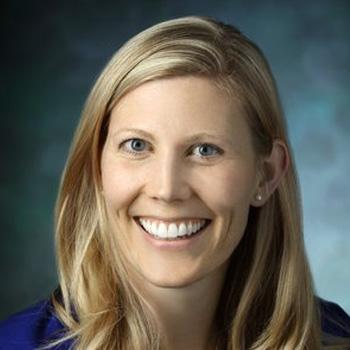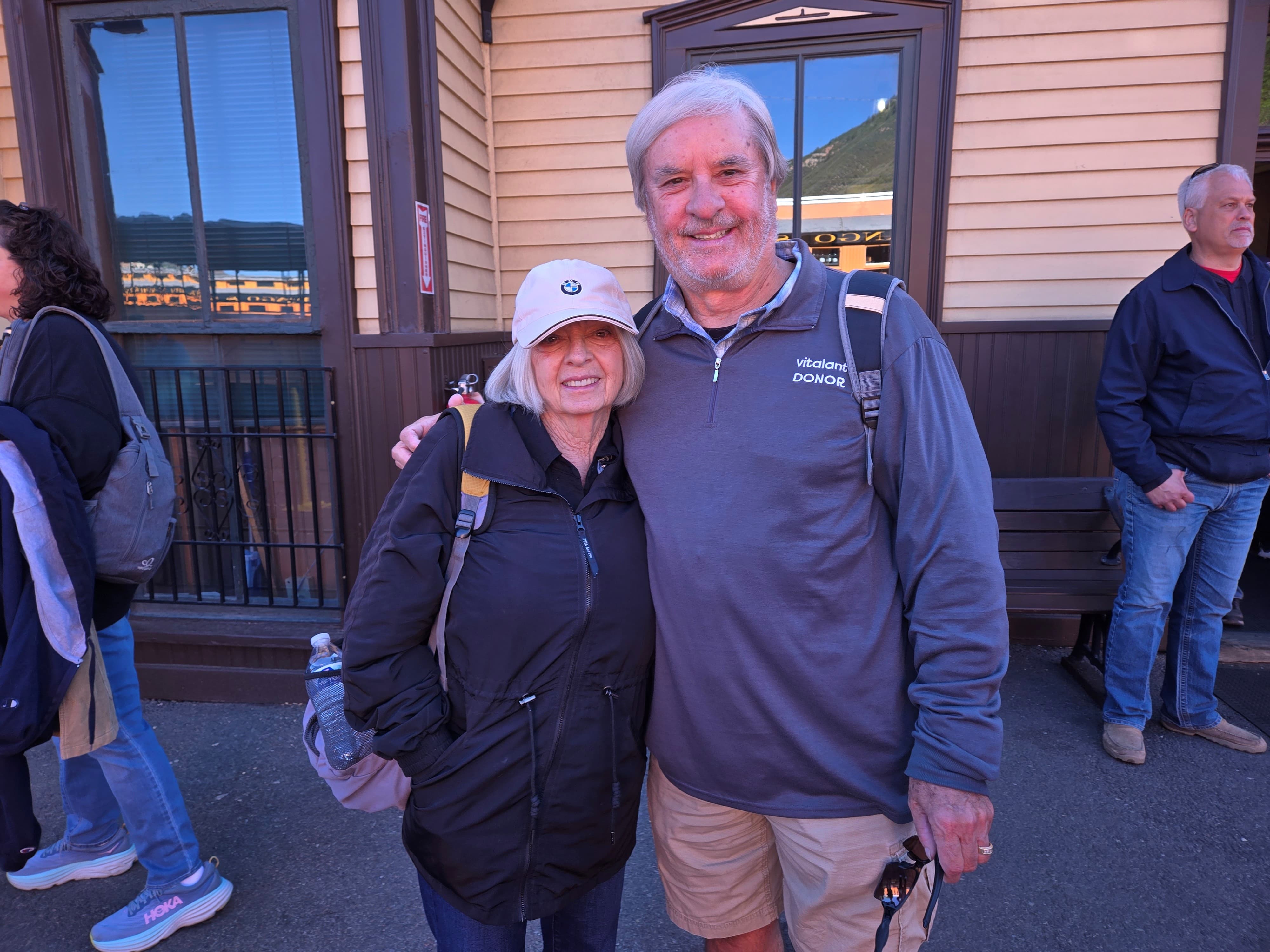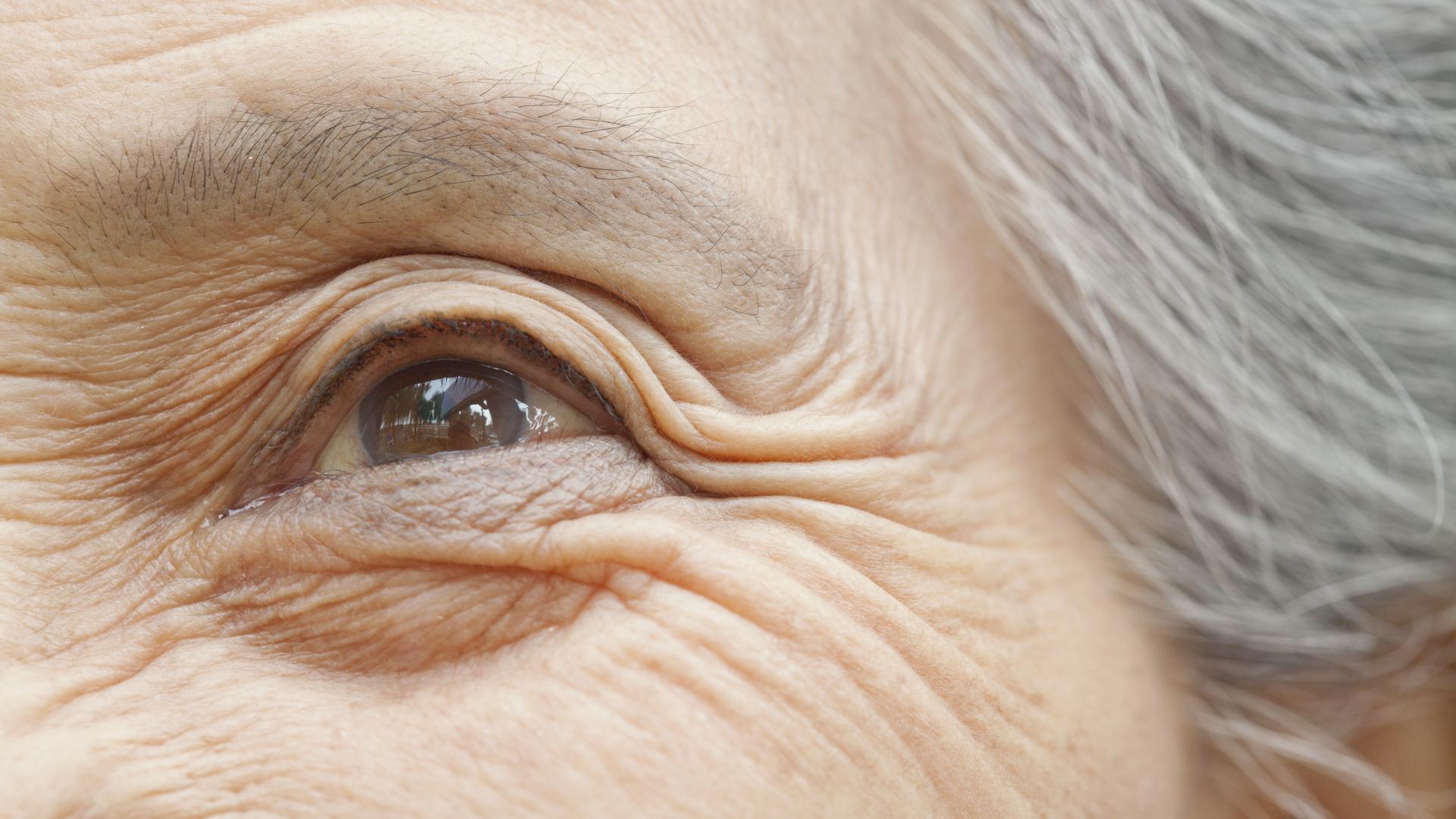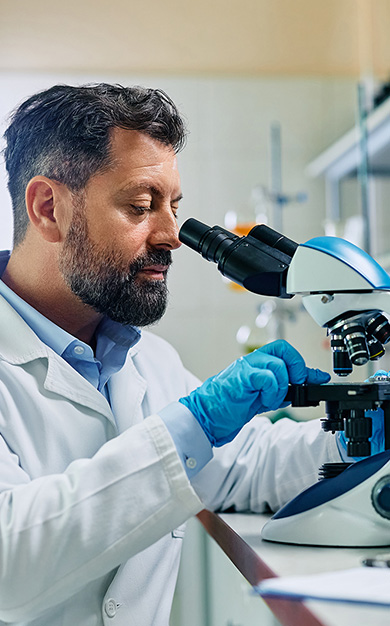Living Well with Vision Loss (2021)
Featuring
Dr. Bonnielin Swenor, PhD, MPH
Director of the Johns Hopkins Disability Health Research Center


Dr. Bonnielin Swenor, PhD, MPH
Director of the Johns Hopkins Disability Health Research Center

This event featured Dr. Bonnielin Swenor, Ph.D., M.P.H., Director of the Johns Hopkins Disability Health Research Center, and an associate professor of ophthalmology at the Wilmer Eye Institute. She is also an associate professor of epidemiology at the Johns Hopkins Bloomberg School of Public Health, as well as a core faculty member at the Johns Hopkins Center on Aging and Health. Dr. Swenor discussed advancements in the field of vision research, the stigma and burden associated with vision loss, and the connection between vision health and cognitive health. Dr. Swenor also advocated for those with vision loss, stating the importance of society becoming more universally designed for those with vision loss.
BrightFocus Foundation
An Update on Dry Age-Related Macular Degeneration and Geographic Atrophy
March 24, 2021
1:00 p.m. EST
Please note: This Chat may have been edited for clarity and brevity.
MICHAEL BUCKLEY: Hello, I’m Michael Buckley with the BrightFocus Foundation, and welcome to today’s BrightFocus Chat, “Living Well with Vision Loss.” If this is your first time joining us, welcome. I’d like to briefly tell you about BrightFocus and what we’ll do today. BrightFocus funds some of the top researchers in the world. These are scientists that are trying to find better treatments and, ultimately, cures for macular degeneration, glaucoma, and Alzheimer’s. We share the news from the research world with families that are impacted by these diseases. We have a number of free materials on our website, BrightFocus.org. And today’s Chat is another way of sharing what’s new in the field of vision research and related issues.
Let me tell you about today’s Chat, “Living Well with Vision Loss.” We’re really excited to have a very interesting and very relevant guest, and that’s Dr. Bonnielin Swenor. She is an associate professor of ophthalmology at Johns Hopkins University. At Johns Hopkins – in addition to being a professor of ophthalmology – she runs their Disability Health Research Center and is a core faculty member at their Center for Aging and Health.
She is with us today because, in addition to being a professor and a researcher at one of the top research centers in the world on vision disease, Dr. Swenor herself is a person living with vision loss. We thought this would be a great opportunity to hear from Dr. Swenor and learn a little bit more about what she does, which I think will be very helpful and relevant.
Dr. Swenor, I’d like to welcome you to the BrightFocus Chat. Tell us about your background and what led you to become a professor of ophthalmology.
DR. BONNIELIN SWENOR: Thank you so much for having me on the show today. I really appreciate the opportunity and this forum, in general. So, my career trajectory certainly has not been a straightforward path. It had many twists and turns, one of which was the onset of my vision loss. I began losing my vision in 2005 quite suddenly. I have myopic macular degeneration, and it started with a retinal hemorrhage at that time, and it was completely unexpected. It happened at time when I was applying to graduate school; I actually had my first retinal hemorrhage a week after I had applied to master’s programs. My vision loss then occurred pretty quickly. I had a pretty rapid decline in vision, multiple retinal hemorrhages over about an 18-month period in just one eye and then in both eyes, and it really changed a lot of—well everything, truly—about my life. I stopped driving. At that time, I was working at a science consulting firm, and I went on disability leave because I was having a hard time with reading, with keeping up. I had no experience at that moment in my life with ophthalmology, and it was just trying to make sense of what was going on and trying to figure out what the path forward was. Truly in those moments, I didn’t believe I’d be able to be where I am today. I didn’t imagine that I could do this work because I did not know anyone else like me—a scientist with vision impairment with low vision. But I obviously pushed through, and because of that experience, it completely reframed my research. At that time when I began to lose my vision, I was studying nutrition and cancer but over time realized my passion and my interest really was trying to understand how to work with people like me and who had vision loss at the outset and how to maximize life with vision loss.
MICHAEL BUCKLEY: Your personal experience… how has that shaped your understanding or empathy or your perspective that, as you said, probably few other scientists have? How has that experience shaped your approach to what you do?
DR. BONNIELIN SWENOR: I really appreciate this question. I think it is … it shapes everything, you know? It is the lens through which I tackle my science. I absolutely view research differently; the ways in which I do it are different; the ways I think about it are different. You know, a couple of years ago, someone asked me if I was a patient first or a researcher first, and I thought that was a really interesting question; I think about that a lot. It’s hard for me to not say I don’t come first with my experience as a person with vision loss; that is really what drives me. My research follows that. So, my work is chasing that experience, if that makes sense. And I think because of that, I do have a different approach. I’m interested in understanding what patients want from a very different angle. I also sort of have that street credit—or that understanding when I talk to other people who have vision loss; we don’t have to explain so much, I guess you would say, and there’s an understanding and a shared knowledge. And it is. It shapes the questions I ask; the way I ask them; and, quite honestly, the way I interpret data. I view it as a very positive thing, you know? Certainly, vision loss is a challenge, but I think it has completely benefitted my career.
MICHAEL BUCKLEY: That’s really interesting. I appreciate that. That are you a patient first or a scientist first is a fascinating question. I was wondering, how has this led you to pick the research topics that you work on? What type of research do you do, and how has that been driven by your experiences?
DR. BONNIELIN SWENOR: My research has three overlapping areas, which are aging, equity, and disability, which includes vision loss—a heavy focus on vision. Those areas came to be my focus organically. I started out studying vision loss and the impact it has on people’s lives. The majority of people with vision loss are older adults, and I appreciated the approach of geriatric research and that it thought about the whole person. And that’s really what I was trying to accomplish. And then the idea of equity really followed closely behind. So, the way I describe the work that I do is, it’s all about using data to change the paradigm from living with vision loss to thriving with vision loss. And what I mean by that is I’m interested in finding ways to really move the needle on how we think about life with vision loss; how we live life with vision loss; and, honestly, how society views that. There’s a lot of work and focus on independence, and my work is using data to go beyond that, right? It’s not just how many people with vision loss have a job—how many people with vision loss are CEOs, kind of an example. I want to understand and create strategies and methods so that people can have maximum life experiences with the vision that they have.
MICHAEL BUCKLEY: I’ve heard you say in other settings that you feel that our society can have a kind of an antiquated view of persons with vision loss. I was wondering if you’d kind of elaborate on that.
DR. BONNIELIN SWENOR: Thank you for that question. Absolutely, you know, this idea that … when people reach out to me, which they do quite frequently, it’s an echo of this idea. It’s not just for vision loss, honestly, it’s for disability in general. It’s an idea that when you have a disability or when you have vision loss, you’re lesser, and we put all of our self-worth in many ways in this basket of independence or whatever we imagine that may be, and there is stigmatization – a downgrading of individuals in their role in society – when they differ around certain aspects. For someone with vision loss, there’s a lot of that thought. There’s language that we use even in our own profession around the burden of vision loss, the burden on society, and that just perpetuates this notion. We need to change that and challenge that and recognize that even though your vision is different, you still are a huge contributor to our communities. You just do things differently. And I also just want to add that we do need to spend time and effort focusing not just on what an individual can to do maximize their health and interaction in society, we also have to spend time, energy, and resources on making society more inclusive, more universally designed, change – exactly to what you asked me about – views of vision loss, views of people with disabilities, of what they can do, and stop focusing on what they can’t do. And that, to me, really is the future, and that is a core part of what I am trying to accomplish with my data and my research.
MICHAEL BUCKLEY: I appreciate that perspective. I think you’re right. I think we often choose words or phrase questions in a certain way. I think those are really interesting points that you made.
Dr. Swenor, as you know, BrightFocus funds research on both brain diseases – Alzheimer’s and related dementia – in addition to the macular degeneration and glaucoma that we’ve been talking about. My understanding of your research and your interests is that you are at that nexus, that intersection, between vision health and cognitive health and brain health.
I was wondering if you could talk about how low vision affects cognitive health, how it affects someone’s brain health as they get older.
DR. BONNIELIN SWENOR: Yes, there is a lot here.. This tends to be a hot topic these days – this interconnection between vision loss and the brain. And I just want to start by saying there are two streams of research in this area. One is that there are hypotheses and data showing that change is happening in your eye, particularly in the back of your eye, reflective of changes happening in the brain. So, the idea here is there’s a possibility that we can look into the back of someone’s eye and be able to identify or project or tell what’s going on when someone’s brain changes, right?
But that’s actually not the work I do. The work I do is all about understanding how vision loss changes people’s behavior, their physical activity, their social interaction, their mental well-being, and how that then could potentially put someone on a faster trajectory of cognitive decline. Because what we know in the broader population of older adults is things like social interaction, physical activity, cognitive stimulation, depression, having hobbies etc. are really important factors that influence your brain aging. But we also know from my work and that of others is those things change for a lot of people with vision loss. And so, my work is about piecing those puzzle pieces together so that we can understand that mechanism—that pathway—to help people figure out what they need to do to age well with vision loss. And brain health is a huge part of that, right? And so, I worry sometimes that when I talk about my research in this space, I’m projecting this idea that you’re sort of doomed to having cognitive decline if you have vision loss because some of the data seem a bit damning when you think of – for lack of a better word—but that’s not the point. The point is that it’s all about understanding this mechanism, this pathway, what we can be doing to maintain a healthy brain as we age, and that may be a little different when you have vision loss.
MICHAEL BUCKLEY: What are some things that a person could do to slow down that trajectory of cognitive decline if they have reduced vision?
DR. BONNIELIN SWENOR: That work is ongoing, admittedly, but learning lessons from the broader population of older adults, it’s the things I indicated: It’s maintaining physical activity; social interaction; doing whatever you can to have good, positive mental health; engaging in hobbies. But we know that’s just more challenging for people with vision loss. And so a lot of the strategies and interventions established for people as they age for physical activity, for example, has really not been tailored for people with vision loss, or people with vision loss haven’t been considered in those programs or strategies. I think for people who do have vision loss, understanding those still are the core components most likely, but they may need to make some changes in the approach to fit them, right? To fit their life … how do you maintain physical activity when you have vision loss? It looks different. And that’s the kinds of things we’re working on.
MICHAEL BUCKLEY: I appreciate that. And you mentioned depression a minute or two ago; I was wondering, are there particular challenges for people with low vision when it comes to their mental health? What have been some of your observations or suggestions for that intersection between low vision and depression?
DR. BONNIELIN SWENOR: This is a great question. I think for so long there’s this assumption that of course you’re going to be depressed; you’re losing your vision, right? And that’s part of the thing I want to challenge, right? So, I want to start off by saying that. I think that is something we’ve got to take a hard look at and think about why is that our assumption that, of course, you should be … we assume people are going to be depressed when they lose their vision. That’s sort of a societal manifestation that we’ve created an environment in society where that’s sort of a reflex, that’s the first thing. The second thing is we’ve almost punted this mental health response that people do experience, it’s real. I experienced that; that happens for, I think, most people who have a vision loss. We sort of punt it all into depression and anxiety. I think we do need to dig deeper, though, because from my experience – personal – and from my research and talking to other people with vision loss, I think it’s just much deeper than that. It is, in part—and this is just me hypothesizing; admittedly, we still need to do more work in this space—it’s in part a reflection, again, of the stigma and stereotype of vision loss that we’re internalizing. It’s also, in part, self-efficacy. When you start to lose your vision, it challenges that, and that does have an impact on your mental well-being. That’s deeper and different than depression and anxiety. But it’s something we need to think about—those aspects. And there’s not a lot of discussion around that, but I think we are now at a place that we need to think about those things. The other angle I would also add is social isolation and loneliness. That has become on the forefront of public health and health concerns for many groups of individuals. We need to do more work for understanding how vision loss affects the way we interact with others socially. As someone with a retinal disease, I can assure you … you know, I know the research. I know the data, but I still feel myself withdraw socially. It’s hard to recognize people’s faces. It’s hard in a group setting to know when someone is looking at you to talk to you, and these are real challenges that often times result in you just interacting less, but what we need to also understand is that there is a cost to that; what is that cost? And then, what are the strategies both within myself as an individual with vision loss but also as a society and creating more acceptance and universal design to change that?
MICHAEL BUCKLEY: I appreciate that, and I wanted to stay on that for a couple more questions. What really struck me, Dr. Swenor, is at the outset, I believe you said 25 when your vision health first became a real issue. And that really stuck with me…that is the beginning of professional adult life and career. I’m wondering how, since people of all ages have professional plans, personal plans, goals, whether that’s through a career or retirement… how does one best to such a big and often abrupt change in kind of the plans that they had in mind for their lives?
DR. BONNIELIN SWENOR: I think this is such an important question. We don’t always dig into this. And I would guess I would answer, first, that I’m not sure at any age that it’s not a big challenge. I talk to a lot of retirees, and they’re feeling it in different ways. They’ve made plans, right? And now they feel like their plans … and they’ve saved, and they worked toward something, and now they feel like they’re all thrown out the window. I think, from my perspective, first of all, that’s a real feeling. And just acknowledging, I think, that it’s very real and okay to feel that way, but I think equally important to recognize you’re not alone.
For me, that was one of the harder parts of it; I didn’t know anyone else like me. I didn’t have anyone else to talk to, and when I found that, that was one of the biggest changes in my life. I’ve seen that. I’ve felt that from other people who have contacted me and have said, “You’re one of the first people I’ve talked to like me.” I think that’s just a really powerful human nature experience.
And for a lot of people with vision loss – particularly when we’re talking about age-related macular degeneration or glaucoma -it is not necessarily someone’s identity, always, so I don’t think they’re perhaps seeking out others like them, but they still are living with going through life in a different way, and that does impact individuals. And so, I think this change is heavy, and it’s hard, but navigating it is all about—at least for me—has all been about strategy and figuring out how to go forward. And a huge part of that is learning from others who have already done it. So, I guess I encourage people out there to find ways to do the same.
MICHAEL BUCKLEY: I appreciate that point. I want to pivot to the whole thing about making adjustments and asking for help. How did that work for you? How did you go about making the adjustments to continue to pursue a career, and were you uncomfortable telling employers or others? How did you begin to move forward?
DR. BONNIELIN SWENOR: It was a slow and hard process and still remains to be one, admittedly. I’m not going to pretend that I have it all figured out—not sure I ever will, but it was … I think asking for help is not within our culture here. It is not for any one for any reason. When I first started losing my vision – and it seems ridiculous to say this now – but it felt like a life sentence. It felt like I was not going to be able to be the thing I wanted to be, which was a scientist; I thought there was absolutely no way. I thought that ship had sailed in those moments, and that was really, really hard.
I think at some point the change for me was I’d worked so hard to just get to where I was and I got to a place where I thought, “You know, I honestly have nothing left to lose; I might as well just try and figure this out—piece by piece, step by step, day by day— because if I try and I fail, that’s the girl going blind couldn’t make it as a scientist; that’s okay.”
But that was me sort of buying into the social stereotype, quite honestly. And I had to let that go. I had to let go of my own internalization of what people with vision loss can and can’t do. And that was my journey. And that was … it still is. But the reality of it—the day to day—was figuring out strategies and that changes for me over time as I lose more and more of my vision, which I do each year. But I took a slow approach—so, I started by taking one graduate class to test myself to see if I could do it, and I didn’t do as terribly as I thought. Then, I took two and I kind of went from there. I was very protective of my status as someone with vision loss; I was very scared to tell anybody because I was afraid I would be judged, that people wouldn’t want to work with me; I didn’t even know the right words. I didn’t identify as someone with a disability. I didn’t know that it was something to be discussed. I didn’t ask for accommodations in my graduate school training in the beginning because I didn’t know how to advocate. I didn’t know I was able to ask for those things. And so, it was just, it was a learning experience, and a journey, and, again, at that time, I didn’t have anyone else to help me through it. I didn’t know anyone else like me that could have given me that guidance.
And as I started to figure things out and become a little more confident that this maybe was something I could do – and admittedly, there was lots of setbacks and challenges – but over time I got a little more confident, and equal parts I’d say confident but also a stronger feeling of, “I really don’t have much left to lose, you know?” [laughs] “Might as well just keep going.” I just have kept moving forward, and, as I indicated, I think connecting with other people who understood me, great mentors who supported me, just accelerated that pace. I never imagined in a million years that I would be where I am today, truly.
I’m not special; I’m not exceptionally gifted in anything. I work really hard, but I do think that it is my unique perspective that has gotten me here, quite honestly. And that’s part of the message too, I want people to understand: When you start to lose your vision, your perspective does change; you do change as a person. There’s no … absolutely, there’s no questioning that, but that doesn’t mean you have less value; you probably have more, in lots of cases, and it’s understanding that and harnessing that that is important for your self-worth, for your health, for so many parts of life.
MICHAEL BUCKLEY: For folks on this call who may still be in the workforce or have friends and family that still are, how does it work in America in 2021 to tell your employer that you’re experiencing vision loss? What type of—I know you’re not a lawyer—but what sort process or rights or advice that you’d give for someone that is either in the full-time or part-time workforce that’s experiencing vision loss?
DR. BONNIELIN SWENOR: This is a very good practical question and one I get quite a bit. So, there’s the law—the ADA, the Americans with Disabilities Act—which prohibits discrimination in the workplace, but then there’s the pragmatic approach, quite honestly. So, what I advise to people is that you have to check in with yourself on where your comfort level is.
I think if you’re applying for a new job, that’s a slightly different position than if you have new vision loss in a job you already had. I think if you are applying for a new job, you have to understand where your comfort level is and if you want to disclose at application or after maybe an offer. And I don’t think there’s a right or wrong.
Legally, the employer is prohibited to discriminate. But the reality is this happens. It absolutely happens, and I’m not going to mince words about that. However, I don’t think for many people you would want to be at a place that would have an unsavory response to disclosing. So, if you are at a place where you have comfort talking about it, disclose it. That’s usually my suggestion.
But, I also recognize that there are situations and times and instances where you don’t feel safe or you just need a job because of financial reasons and you don’t want to disclose, so I can’t just have that as blanket advice. Now, I think for people who have lost their vision or are already employed and have new vision loss, that also produces a different kind of challenge. Often times it will change dynamics—especially if you need an accommodation—and there is a process for that, and there are protections on a legal level. However, again, I think for people going through this, it behooves you, it’s in your best interest to understand your rights. Understand the iterative process in getting an accommodation to get the most out of it. I think, a lot of times, people expect that they’ll ask for an accommodation, and it is their employers’ job to tell them the best accommodation for them. And it’s really not; it’s a conversation. It’s figuring things out, and that’s sort of by design, but sometimes that falls apart. I guess all of that is to say, this is still, I think, a thorny issue for so many people. And understanding how to advocate for yourself is still a critical component to this.
MICHAEL BUCKLEY: That’s great advice and perspective. We have two of our listeners who have asked a similar question. Basically, they’re wondering about your daily life. Do you have any specific tools or apps or things that you think might be helpful for our audience to know that help you in your daily life?
DR. BONNIELIN SWENOR: I also get this question quite a lot. I say the three things I use the most—or the three strategies I have, I think, surprise people. The two apps that have helped me the most in my daily life are Uber and Amazon. And I know they’re not low-vision specific, but they changed my life. Right? I don’t drive anymore. I don’t do well in stores. I can’t find items on a shelf. So, Uber has expanded where I can live, where I can go, and when I can get there. That’s life-changing for me. And Amazon … I can order my groceries where I live. I can order my groceries; I can order anything. And I never need to be in the store and just struggle to find things. Those have honestly had the biggest impact on my life more than any other technology.
Since I have central vision loss but still have peripheral vision, it makes for confusing visual input. I have extreme visual fatigue. I get migraines, and I basically describe it as, “I have so much good vision that I can power through and make sense of the world in any given day.” I tend to use most of that for my job. So my strategy is to build the majority of my life around not using my vision to do tasks that I don’t need to use it for. If anyone would come to my home, it is meticulously organized, and my kids and my husband know everything has to go back where it goes so I can find it without scanning or searching; the milk always goes where the milks goes. I’m not a happy camper because then I’ve had to waste vision to search for it. My kids are very good about it now. My clothes are in specific ways or specific places in my closet without variation, because I don’t want to waste the visual energy scanning and searching, and that’s just actually something that’s always helped me get through my day better with less exhaustion.
MICHAEL BUCKLEY: Dr. Swenor, as we conclude, I think it’s safe to assume that you’re a tremendously inspiring person for many people that are impacted by vision loss… so I wanted to turn that around in the other direction. In the people with vision loss and all the others you interact with through your work at Johns Hopkins, what have you learned or been inspired by from them?
DR. BONNIELIN SWENOR: This is an excellent question. Hands down, my colleagues are completely dedicated to their patients, to the people I work with, work for, dedicate their lives to serving. And that goes beyond, I think, anything I could describe well. Knowing that has really been everything for me. Knowing that there are so many people who work tirelessly for people like me is really an amazing thing. And to be surrounded by that, it has been inspiring for me. It makes me feel less alone in a different way but in a very important way. And I often wish I could articulate that in a broader sense so that more people like me living across the country could understand just how many people are dedicated to research, to care, who truly are spending day, night, weekends, hours, for them. It’s amazing.
MICHAEL BUCKLEY: That gratitude you mention, I would think that allows you to continue to be able to do your work and to be helpful for people across the country or all around the world. It’s been just a fascinating conversation today. Dr. Swenor, I appreciate your being so generous with your time, and I really appreciate your honesty in sharing your experiences. I hope that they will be of value to our listeners.
DR. BONNIELIN SWENOR: Thank you so much for having me. I appreciate it.
MICHAEL BUCKLEY: My pleasure. On behalf of BrightFocus Foundation, thank you to everybody who joined us today. We will be back May 26 for a discussion about safety and older drivers. On behalf of BrightFocus Foundation, thank you for joining us.
BrightFocus Foundation is a premier global nonprofit funder of research to defeat Alzheimer’s, macular degeneration, and glaucoma. Since its inception more than 50 years ago, BrightFocus and its flagship research programs—Alzheimer’s Disease Research, Macular Degeneration Research, and National Glaucoma Research—has awarded more than $300 million in research grants to scientists around the world, catalyzing thousands of scientific breakthroughs, life-enhancing treatments, and diagnostic tools. We also share the latest research findings, expert information, and resources to empower the millions impacted by these devastating diseases. Learn more at brightfocus.org.
Disclaimer: The information provided here is a public service of BrightFocus Foundation and is not intended to constitute medical advice. Please consult your physician for personalized medical, dietary, and/or exercise advice. Any medications or supplements should only be taken under medical supervision. BrightFocus Foundation does not endorse any medical products or therapies.

In recognition of National Caregivers Month, this episode explores the vital role of those who support individuals living with vision loss—whether family members, professionals, or volunteers.

Dr. Jeffrey Stern and Dr. Sally Temple, Principal Investigators and Co-Founders of the Neural Stem Cell Institute, will explain what stem cells are and share the latest updates from clinical trials.

Dave and Leanna Palmer share their commitment to supporting Macular Degeneration Research.

Join Dr. Sara Fard, a retina specialist at Illinois Retina Associates, as she explains the benefits of sustained GA treatment, including slowing the rate of vision loss, protecting retinal tissue, and supporting daily visual function.
Help Fight Macular Degeneration and Save Sight
Your donation helps fund critical research to bring us closer to a cure for this sight-stealing disease and provide vital information to the public.
Donate Today